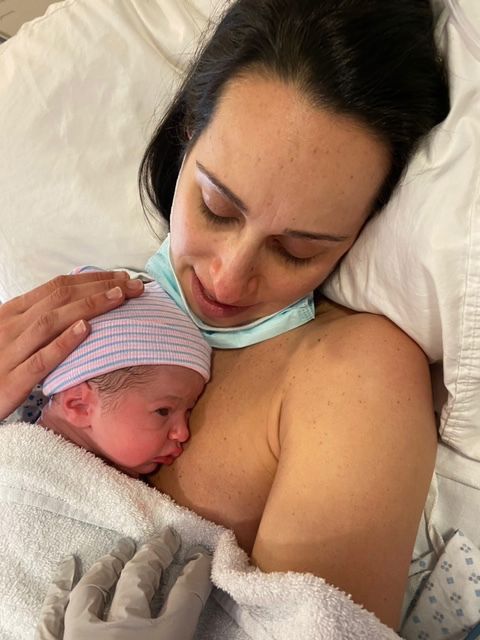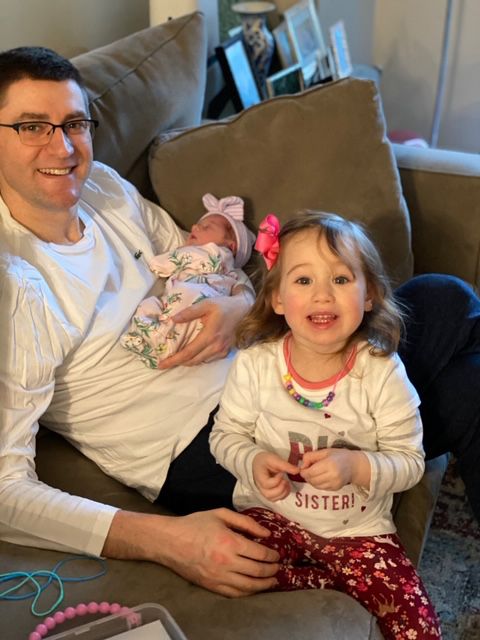One Sunday evening, I got a text from a friend: She’d read that the NewYork-Presbyterian health care system was going to ban spouses and partners from the delivery room due to efforts to contain the spread of COVID-19, the disease caused by novel coronavirus. At that point, it was the day before I was scheduled to be induced at one of their hospitals.
My immediate reaction was denial. I furiously searched for any info I could find on social media, but Twitter, Facebook, and even the hospital’s website were unhelpful. At that point, I just held onto hope that the rumors weren’t true.
My husband and I tried to call my ob-gyn, but since it was Sunday at that point, I couldn’t reach anyone. In desperation, I called a COVID-19 hotline that the hospital had set up. The person who answered confirmed that, as of that morning, they had shifted to a no-guest policy (the only exception was for end-of-life circumstances). She recommended we speak with my ob-gyn before going into the hospital, as policies were changing rapidly.
I couldn’t stop crying.
I have daughter who is 2, and she kept asking me, “Mommy why are you so sad?“
My husband told me he felt guilty that he couldn’t be there for me. And he was of course devastated that he wouldn’t be present for our daughter’s birth.
I reached my ob-gyn by phone the next day (a Monday) at 9 a.m., and she explained that the hospital had instituted the policy in order to stop the spread of the virus and save lives. She said that limiting the number of people physically present in the hospital was the only way that medical professionals knew how to do that. I told my gyno that if my husband couldn’t be there physically, I wanted him to participate virtually, which luckily she encouraged.
Although I was reeling, I couldn’t consider other options like looking into a hospital outside of New York City. Because of earlier pregnancy complications—at one point, my baby’s placenta was covering part of my cervix, and then my doctor spotted some blood outside of the blood vessel between the placenta and the wall of the uterus—my doctor didn’t want me going past 40 weeks. In fact, I was supposed to be be leaving our apartment to go to my scheduled induction in eight hours.
On Monday evening, we put our daughter to bed, and a neighbor came to stay in our apartment with her.
My husband and I walked the half-mile to the hospital. There wasn’t another soul on the street; it was so eerie.
We arrived at the hospital just before 8 p.m. My husband wasn’t even allowed to walk me through security. I was given a standard surgical mask to wear (which I was instructed to keep on the entire time I was in labor). Then, I had to say goodbye to him in the hospital lobby. I was crying so hard I was practically hyperventilating.
The security guard walked me up to the labor and delivery floor. As I was admitted, the staff gave me a COVID-19 test by taking a swab sample in my nose.
I called my husband via FaceTime, and anytime someone came into examine me, they spoke to him, too, so he could stay informed. All of the nurses, physician assistants, and hospital staff were extremely supportive, and I know they were doing the best they could in a tough situation. That said, I had assumed that the hospital would have support people to be by my side as I labored. But for the majority of the time I was there, I was alone. The only time someone came in my room was to come to fix my IV bag or to check my progress.
Learn more about novel coronavirus:
During the 90 minutes I spent in active labor, I texted my husband and sister (who’s a nurse) almost constantly. “Is it normal to feel nauseous, itchy, and have a headache?” I’d ask her. I felt pressure and asked if that meant the baby was close to being delivered. It felt odd not being able to ask someone on-site, but later, a nurse told me that they were short-staffed since many people called out sick (I’m not sure if it was with COVID-19 or other illnesses).
Because of the staffing issues, nurses told me that that they were going to stop giving me the medication to induce my labor in order to prioritize other deliveries that were further along or higher priority. That slowed down the process for me.
Lonely and sad. That’s how I felt during labor.
My husband sat on the phone with me throughout the night while our older daughter slept. We didn’t even talk much while we were on FaceTime; it was just nice to have someone on the other end of the line.
By the way, that mask they had me wear? It made it tough to breathe while in labor. My COVID-19 test came back negative 10 hours after I’d taken it. I was told to continue wearing the mask, but I was given permission to remove it if I was really having trouble breathing.
Around 11 a.m. on Tuesday, about 13 hours after I was first induced, my doctor told me I could start pushing. My ob-gyn, the physician assistant, and the nurse were the only ones in the room with me. My husband stayed on FaceTime the entire time—I had to prop up my iPad on the bedside table so that he could see.
During labor, I wasn’t very emotional. I was just focused on getting the job at hand done. I had to be strong, remain calm, and rely on the instructions from my ob-gyn to get me through.
That changed as soon as my daughter was born.
 Courtesy of Lauren Pelz
Courtesy of Lauren Pelz
I was overwhelmed with emotions when the nurses handed her to me for the first time, but I felt so sad for my husband that he wasn’t with us and could only see what was going on through the video stream.
Ultimately, though, I was just relieved she was healthy.
The nurses volunteered to take some pictures right after they handed my daughter to me. I have a sweet, but extremely sad photo of the first meeting of the three of us. You can see my husband grinning, as you’d expect—but he is on the iPad screen.
Recovery was strange, too. With my first daughter, I got a private room. But this time, those rooms were reserved for COVID-19-positive moms, so I had a shared room with a roommate. I was impatient for my husband and toddler to meet our new baby, so we got clearance to go home early (rather than two days of recovery, we just stayed for one). I also wanted to get out to lower the potential risk of my daughter or me contracting the novel coronavirus.
As I was being pushed out in a wheelchair, my husband was waiting for us in the lobby. That’s where he officially met his daughter for the first time.
You’d better believe I signed a petition encouraging hospitals to reverse partner bans.
Childbirth can be scary. At times, being in delivery alone felt dangerous. I was concerned because I didn’t have people to ask questions of or check on me very often during labor. And that’s coming from someone who has already done this once. I can’t imagine going through this if I was a first-time mom. My husband is my rock and his presence and support were taken away from me.
 Courtesy of Lauren Pelz
Courtesy of Lauren Pelz
The partner ban went into effect on Monday, March 23. I had my daughter on March 24, and then, on March 28, Governor Cuomo issued an executive order mandating hospitals to allow women one support partner. I am glad they lifted the ban. While I understand that the hospital had to keep everyone safe, the decision felt rushed and not well planned. Unfortunately, the timing didn’t work out in my favor. Still, I am happy other women won’t have to experience what I did.
While the experience has been surreal, our daughter is healthy. During these sad and uncertain times, I’m just staying focused on that fact and enjoying our new addition.
Source: Read Full Article
